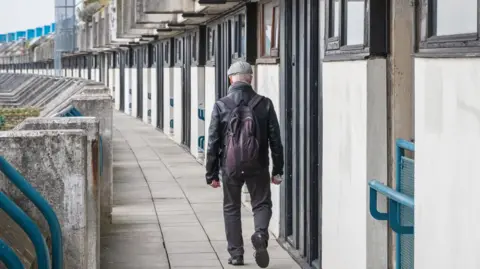## Rising Complaints in Social Housing: A Crisis in England
In recent times, there has been a noticeable surge in complaints regarding substandard living conditions in social housing across England. According to a report released by the Housing Ombudsman, the number of grievances has escalated dramatically, now exceeding five times the volume recorded just five years ago. This increase in dissatisfaction has been described as a direct reflection of an ongoing crisis in the social housing sector, prompting urgent calls for reform.
Richard Blakeway, the Housing Ombudsman, articulated the issues faced by tenants during a recent interview with the BBC. He pointed out an alarming “imbalance of power” between tenants and landlords, which has led to what he describes as a “simmering anger” among individuals living in social housing. This tension has ramifications that extend beyond simple discontent; it threatens the very foundation of social housing in England, raising concerns about a potential “managed decline” if changes are not implemented swiftly.
The complaints received by the Housing Ombudsman relate to a range of substandard living conditions, including serious issues such as the presence of asbestos, fire safety hazards, and severe pest infestations. Tenants have also reported problems with dampness, leaks, and mould—conditions that can profoundly impact their health and well-being.
### Breakdown of Trust and Communication Gaps
The latest report from the Housing Ombudsman highlights that the general conditions of social housing, combined with the prolonged duration of repairs, are eroding trust between tenants and landlords. Blakeway noted contributing factors like aging housing stock, rising costs of materials, and a shortage of skilled labor. He remarked that these elements create a “perfect storm,” illustrating the unsustainable state of affairs afflicting the social housing sector.
Furthermore, tenants frequently find themselves with limited options or influence over the services provided to them, leading to an increase in frustration and dissatisfaction. While the Ombudsman acknowledged that social landlords are committing unprecedented amounts—£9 billion between 2023 and 2024—to address repairs, he emphasized the historical underfunding that continues to hinder effective solutions.
In addition to funding issues, Blakeway identified a critical need for improvement in communication between landlords and tenants. Instances have been reported where tenant interactions are perceived as lacking the dignity and respect they deserve.
### Statistical Insight and Children in Poverty
The report paints a grim picture of the state of housing in England. In the year leading up to March 2025, a staggering 6,380 complaints were investigated, a sharp increase from just 1,111 in March 2020. This rise signifies not only growing discontent but also highlights the broader societal implications of inadequate housing, particularly for vulnerable populations.
Current estimates suggest there are around 1.5 million children living in “non-decent” homes, with nearly 19% of those residing in social housing. Given the significant implications of poor living conditions on physical and mental health—alongside its effects on community cohesion and educational attainment—this situation demands urgent intervention.
The Housing Ombudsman is advocating for a “transformative overhaul” of the existing social housing framework. This proposal includes an independent review of funding practices and the establishment of a “national tenant body” to amplify tenant voices and enhance landlord accountability.
### The Human Cost of Poor Living Conditions
The ongoing poor living conditions not only affect tenant satisfaction but also pose long-term risks to community integrity and public health. Blakeway warned that without substantial reform, England could face a significant deterioration of one of the largest social housing provisions in Europe. The consequences extend beyond mere discomfort; they could spark social unrest fueled by continued frustrations over inadequate housing.
Housing campaigners, including Kwajo Tweneboa, have also voiced concerns about these systemic issues. Tweneboa noted that for many tenants, merely reaching the Ombudsman requires a formal complaint to be lodged with their landlord, underlining the barriers residents face in conveying their grievances. Many feel ignored and treated merely as rental units, which only compounds their sense of frustration and hopelessness amid deteriorating living conditions.
In response to these escalating issues, a spokesperson from the Ministry of Housing emphasized the commitment to enhancing living standards in social housing. Citing “Awaab’s Law,” which aims to clamp down on issues like dampness and mould by implementing necessary legislation from October, the Ministry assures that decisive measures are being taken to ensure everyone has access to safe and secure housing.
As the social housing crisis escalates, the need for attention, action, and advocacy remains urgent and essential. The ongoing discussions surrounding the state of social housing reflect the wider societal responsibility to ensure that all individuals have the right to acceptable living conditions.



